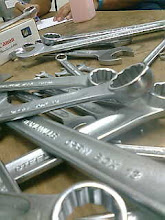| Waddington | 1902-06 |
| Waddon-Ehrlich | 1981-82. 250cc Rotax racer. |
| Wag | 1924-25 |
| Wakefield | 1902 |
| Wall | 1909-16. Made Wall Autowheel, also produced ROC. |
| Wallis | 1925-26. Hub-centre steering. |
| Ward | 1915-16 |
| Wardill | 1924-26 (1926?) Unusual two-stroke. |
| Warland | 1923 |
| Warrior | 1921-23 |
| Warwick | 1909-15. Made by PMC. |
| Wasp | Small British firm near Salisbury, specializing in custom sidecar competition motocross ('side-car-cross') and grass track bikes as well as a few enduro machines using Triumph and later Norton engines. Founded in 1963 by Robin Tutt. |
| Wassell | Founded by WW2 pilot Ted Wassell of Birmingham as a wholesaler of motorcycle parts and accessories. Make a motocross machine powered by a 125cc Puch engine in 1970 and a trials bike with a 175cc BSA Bantam engine. Made an offroad bike with 125cc Sachs engine in 1972. After making more than 2,000 machines, high manufacturing costs and a falling American dollar made his bikes too expensive for the US market, so he closed production in 1975. |
| Watney | 1922-23 |
| Watsonian | Sidecar manufacturer, started making its own motorcycle in 1950 using a 996cc sv V-twin JAP engine. Produced only a few before lack of interest closed the project and they returned to sidecars. |
| Waverley | 1921-23 |
| WD | 1911-13 (1912-13?) |
| Wearwell | 1901-06 (1901-03?) |
| Weatherell | 1922-23 |
| Weaver | 1922-25. Made by Alfred Wiseman. |
| Wee McGregor | 1922-25 |
| Welland | 1920-22. Made by Spartan. |
| Weller | 1902-05. Cars and motorcycles. |
| Weslake | British designer and engineer Harry Weslake started making advanced carburetors in the early 1920s under the name Wex (Weslake-Exeter). He started working on improving Sunbeam engines in the late 1920s and developed several innovations for them, George Brough, Jaguar, Norton and others. He formed Weslake and Taylor in 1936 with Geoffrey Taylor. He expanded after WW2 as Weslake and Company to increased R&D and consulting for many firms, government agencies and racers, also designing and building new engines. The company also made engine conversions for the Rickmans. The first complete Weslake speedway machines were produced in 1977. Weslake died in 1978. |
| Westfield | 1911-13 (1902-04?) |
| Westovian | 1903 (1914-16?) |
| W&G | 1927-28 |
| Wheatcroft | 1924 |
| Whippet | Name used by three firms. First made small-engined bikes 1903-06 with Aster and FM engines. Second made 180cc scooters from 1920-59. Third made small scooter-moped machines (46-64cc) from 1957-59. |
| Whirlwind | 1901-03 |
| White & Poppe | 1902-22 Mostly made engines for other firms, but also made its own complete machines. |
| Whitley | 1902-06 (1902-04?). Engines, some water-cooled, and some complete motorcycles. |
| Whitwood | Produced by the OEC company, they specialized in two-wheel cars, with two doors, folding hood and windscreen, offered first in 1934. They had four models with engines from 150 to 1000cc. two small outrigger stabilizing wheels kept the machine stable at rest. Despite some innovative designs, they stopped production in 1936. |
| Wigan-Barlow | 1921-22. Coventry. |
| Wilbee | 1902-06. |
| Wilkin | 1920. |
| Wilkinson-Antoine | 1903-06. Made in Belgium. |
| Wilkinson | Sword company. Made motorcycles from 1903 until 1916, when they concentrated on, among other things, razor blades and garden tools. Made the TAC (Touring Auto Cycle) in 1909 and TMC (Touring Motor Cycle) in 1911, four-cylinder, air- and liquid-cooled, 676cc (later 848 and 996cc). The TAC was piloted by a steering wheel, like today's cars. Made a shaft-drive in-line four in 1909. Production was taken over by the Ogston Motor Company from 1914 to 1916. |
| Williamson | 1912-20. Early machines had air/water cooled 996cc flat twin. |
| Willow | 1920. Scooter. |
| Win | 1910-14. Used Precision engines. |
| Winco | 1920-22. |
| Wirral | 1902-06 |
| Witall | 1919-23. Lightweights. |
| Wizard | Later name for Fowler & Bingham machines, also FB Wizard. |
| Wolf | Started making motorcycles as Wearwell Cycles in 1901. Production fluctuated on and off until 1931 when the company came back with two models, then made several models with Villiers engines until 1940, when production ceased. |
| Wooler | Founded by John Wooler in 1911 (who designed his first bike in 1909, a two-stroke horizontal single with a double-ended piston). Known for unusual designs including several fore-and-aft twins, vertical camshaft single, transverse four beam engine and a transverse flat four. His first motorcycle was a 230cc two-stroke with front and rear plunger springs and a patented 'anti-vibratory' frame. The bike was made by Wilkinson from 1912 and marketed as Wilkinson-Wooler, raised to 344cc. Production halted during WW1 and resumed in 1919 with a new, advanced bike nicknamed the 'Flying Banana.' More re-designs followed with more innovations until 1930, when the Depression closed the company. Wooler returned in 1945 with a prototype 500cc transverse four. It was displayed at the Earls Court show in 1948 and again in 1951 and 1954. However, only half a dozen hand-built machines were ever made and the machine never materialized in production. |
| Wulfram | 1912-28. Singles and V-twins made by Wolf. |
| Wynne | 1919. Scooter. |
Wednesday, 3 August 2011
British motorcycle manufacturers - W
Subscribe to:
Post Comments (Atom)






0 comments:
Post a Comment